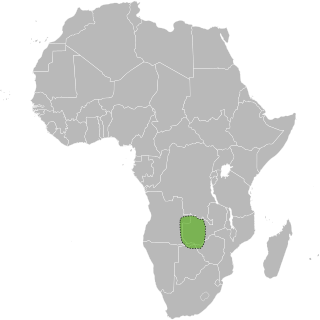Related Research Articles

Lozi people, or Barotse, are a southern African ethnic group who speak Lozi or Silozi, a Sotho–Tswana language. The Lozi people consist of more than 46 different ethnic groups and are primarily situated between Namibia, Angola, Botswana, Zimbabwe including half of eastern and northern province of Zambia inhabiting the region of Barotseland.

Barotseland is a region between Namibia, Angola, Botswana, Zimbabwe including half of eastern and northern provinces of Zambia and the whole of Democratic Republic of Congo's Katanga Province. It is the homeland of the Lozi people or Barotse, or Malozi, who are a unified group of over 46 individual formerly diverse tribes related through kinship, whose original branch are the Luyi (Maluyi), and also assimilated Southern Sotho tribe of South Africa known as the Makololo.

The Kololo or Makololo are a subgroup of the Sotho-Tswana people native to Southern Africa. In the early 19th century, they were displaced by the Zulu, migrating north to Barotseland, Zambia. They conquered the territory of the Luyana people and imposed their own language. The combination of Luyana and Kololo languages gave rise to the current Lozi language spoken by the Lozi people, descendants of the Luyana and nearby tribes. In 1864, the Kololo kingdom was overthrown and some chiefs moved to Chikwawa District, Malawi, with David Livingstone.

Lewanika (1842–1916) was the Lozi Litunga (King) of Barotseland from 1878 to 1916 . A detailed, although biased, description of King 'Lubossi' can be found in the Portuguese explorer Alexandre de Serpa Pinto's 1878–1879 travel narrative Como eu atravessei a África.
The Litunga of Barotseland is the king of the Barotse people. The Litunga resides near the Zambezi River and the town of Mongu, at Lealui on the floodplain in the dry season, and on higher ground at Limulunga on the edge of the floodplain in the wet season. The Litunga moves between these locations in what is known as the Kuomboka ceremony.
Mbololo was a Litunga (chief) of Makololo tribe, a successor of Liswaniso. He ruled from 1863 to 1864. He was the last king of the Makololo dynasty.

Sipopa Lutangu was the leader of the Lozi revolution and later a Litunga (king) of the Lozi people. He ruled from 1864 to 1876.
Mulambwa Santulu was the 10th litunga (king) of Barotseland who ruled from 1780 to 1830. He is one of the most fondly remembered Luyana kings. He is famous for introducing a series of reforms such as a new constitution into the Lozi Kingdom. He has been called "Mulambwa Mutomi Wa Mulao" which translates to "Mulambwa the creator of laws."

Mwanawina I was a Litunga of Barotseland in Africa.
Notulu is a name shared by several noblewomen of Barotseland in Africa.
Mulena Yomuhulu Mbumu wa LitungaYeta I was a High Chief of the Lozi people in Barotseland, Africa.
Mulena Yomuhulu Mbumu wa LitungaYeta II Nalute was an African High Chief, king of the Lozi people and Barotseland in Zambia.

Mulena Yomuhulu Mbumu wa LitungaMwananyanda Liwale was a King of Barotseland in Zambia, very unpopular ruler.

Mulena Yomuhulu Mbumu wa LitungaSelumelume Muimui was a Chief of Barotseland in Africa.

Mwanawina II was a King or Chief of the Lozi people in Zambia, Africa, a member of the third dynasty of Litungas. His full title was Mulena Yomuhulu Mbumu wa Litunga.
Akufuna Tatila was a Litunga, Chief of the Lozi people of Barotseland in Africa, but he ruled for a very short time and his power was weak. His full title was Mulena Yomuhulu Mbumu wa Litunga.
Yeta III was a king of Barotseland, of the Lozi people in what is now Western Zambia.
The Vambunda are a Bantu people who, during the Bantu migrations, came from the north to south-eastern Angola and finally Barotseland, now part of Zambia. Their core is at present found in the south-east of Angola from the Lunguevungu river in Moxico to the Cuando Cubango Province.
References
- ↑ Encyclopedia of the Peoples of Africa and the Middle East by Jamie Stokes, Anthony Gorman
- ↑ Mutumba Mainga, Bulozi Under the Luyana Kings
- ↑ The Elites of Barotseland, 1878-1969 by Gerald L. Caplan
- ↑ Your friend. Lewanika: the life and times of Lubosi Lewanika, Litunga of Barotseland 1842 to 1916 by Gervas Clay